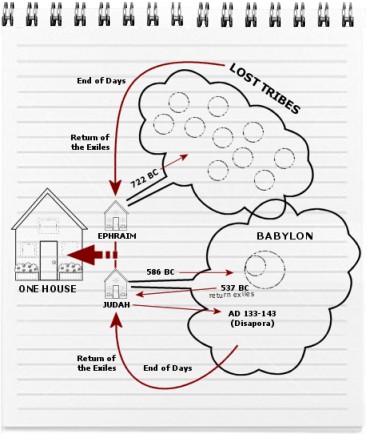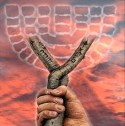|
Recently I was asked what I thought of the so-called "Two House" theology, that is, the notion that "Christians" are actually (hidden) members of the "lost tribes" of Israel. My response to the question follows....
Generally speaking, the Two House Theory (or "Ephraimite Movement") thinks that "Christians" are actually members of the "lost tribes" of Israel (Ephraim is often used as a synonym for the Northern Kingdom of Israel). Based on readings from the prophets Ezekiel (Ezek. 37:15-28) and Jeremiah (Jer. 31:31), this doctrine maintains that one day the lost tribes (i.e., the church) will be reunited with the "house" of Judah (i.e., the Jews) under the terms of the New Covenant. For point of reference, here's a quick drawing I made to illustrate the idea:
 |
How did the linkage between Christians and the "lost tribes" take place? Well, according to Two House Theology, the phrase zaro yeyeh melo hagoyim (ū¢ųĘū©ų░ūóūĢų╣ ūÖų┤ūöų░ūÖųČūö ū×ų░ū£ų╣ūÉųŠūöųĘūÆų╝ūĢų╣ūÖų┤ūØ) ["his seed shall become a multitude of nations," Gen. 48:19] meant that Ephraim would become a multitude of "goyim" (nations). Ephraim eventually became the Northern Kingdom that was taken captive by the Assyrians in 722 BC and dispersed as the "lost tribes" of Israel. Somewhere along the line (no one knows how), these lost tribes became "Christianized," and therefore these Christians are the "lost tribes" of Israel in disguise!
So...what should we think about all this?
First, it should be noted that the concept of a "lost tribe" is questionable. Scripture is clear that the Jewish people would one day be scattered (Moses prophesied as such: Deut. 4:27-28, 30:1; see also Jer. 30:11; Micah 5:7-8), but is equally clear that they would one day all be regathered (Isa. 11:11-12; Jer. 16:14-15; 23:3-8; 31:10; Ezek. 11:17-19; 39:28; Zeph. 3:20). Before the exile of the Northern Kingdom, there was significant intermingling of the twelve tribes (2 Chron. 11:3,16, 15:9), so much so that after the Babylonian Exile the term Jew and Israel were used interchangeably (Ezra 8:35; 10:25; Neh. 12:47). The idea that the Northern Kingdom of Israel somehow became "Gentiles" after the Assyrian captivity is therefore false. In fact, Ezekiel prophesized that Israel (Ephraim) would be regathered from among the nations in the latter days (Ezek. 37:21), but how does that make sense if the nations (goyim) are to be understood as Ephraim? In the New Testament, as well, the term "Israelite" and "Jew" are used interchangeably. Paul calls himself both. When contrasting Israel with the Gentiles in Romans 11, for example, Paul's doctrine is made incoherent using Two House assumptions. James, the half-brother of Yeshua, also wrote to the "Twelve Tribes" scattered - not to the "Ten Tribes" or to "Ephraim" (James 1:1).
The idea that Ephraim would be a multitude of peoples needs to be compared to Abraham, who was likewise given this blessing and told: Av-hamon goyim (ūÉūæųŠūöų▓ū×ūĢų╣ū¤ ūÆų╝ūĢų╣ūÖų┤ūØ ūĀų░ū¬ųĘū¬ų┤ų╝ūÖūÜųĖ) -- a play on words to form the name Abraham. The "goyim" that issued from Abraham include Midianites, Ammonites, Edomites, Moabites, and other Semitic peoples. If taken literally, we wouldn't think that these various tribes are "really" part of ethnic Israel? Nor does the word "goy" pertain exclusively to Gentile nations. Israel is frequently called goy kadosh - "a holy nation" - that will be (ethnically) preserved (as a goy) forever. The LORD says that only if the sun and stars change their fixed order will Israel cease being a nation (goy) before Him: ūÉų┤ūØųŠūÖųĖū×ų╗ū®ūüūĢų╝ ūöųĘūŚų╗ū¦ų┤ų╝ūÖūØ ūöųĖūÉųĄū£ųČų╝ūö ū×ų┤ū£ų░ų╝ūżųĖūĀųĘūÖ ūĀų░ūÉų╗ūØųŠūÖų░ūöūĢųĖūö ūÆųĘų╝ūØ ū¢ųČū©ųĘūó ūÖų┤ū®ų░ūéū©ųĖūÉųĄū£ ūÖų┤ū®ų░ūüūæų░ų╝ū¬ūĢų╝ ū×ų┤ūöų░ūÖūĢų╣ū¬ ūÆų╝ūĢų╣ūÖ ū£ų░ūżųĖūĀųĘūÖ ūøųĖų╝ū£ųŠūöųĘūÖųĖų╝ū×ų┤ūÖūØ (Jer. 31:36). The premise, then, that "goy" always means "Gentile" is simply wrong.
Two House doctrine is sort of "Replacement Theology" in reverse. In it's zeal to correct the false teaching that the Church replaces Israel, Two House doctrine says that Israel replaces the Church. Since Gentiles (goyim) within the Church are "really" Ephramites (i.e., Israelites), the end game is to have both "houses" reunited as one in the plan and purposes of God (Ezek. 37:15-28). This, say the Two House followers, is the "mystery" of the "one new man," which is understood eschatologically rather than presently (i.e., the one house will come in the future).
Two House Doctrine confuses the idea of "grafting in" of Gentiles into the commonwealth of Israel with the idea of replacing the tribes of Israel. This doctrine essentially undermines the true unity of the Body of Messiah where there is "neither Jew nor Greek, male nor female," etc. Though the Church (ekklesia of Yeshua) is called "mystery" (i.e., previously unrevealed until the advent of Messiah) and Christians are partakers of the covenantal blessings of Abraham, this doesn't mean that they are literally incorporated into ethnic Israel. Being spiritually born again doesn't mean you are physically a descendant of a lost tribe of Israel. The ekklesia of Yeshua is not physical Israel but a new (╬║╬▒╬╣╬Į╬┐Žé) spiritual entity: Jesus' Kingdom is a spiritual kingdom "not of this world" (John 18:36) and his followers would rule and reign with Him there. God has a plan for both national Israel as well as His church. His promises made to ethnic Israel, beloved on account of the fathers (see Rom. 11:28), will be fulfilled literally in the coming millennial Kingdom of God on earth. The exact role of the "church" during this time is unclear, but it is certain that the church will not be inheriting real estate in the Mideast at that time....
Lastly, the question must be made regarding the relevance of this teaching. What practical difference does it make for the follower of the Messiah to believe that he/she is part of ethnic Israel? Will such a belief help you in your daily walk of faith with the LORD?
I would surmise that the underlying motivation for the Two House Theology is for its advocates to feel more identified with Israel and her destiny. After all, if the promises found in the Tanakh are exclusively for national, ethnic Israel, the Christian might feel a bit left out of the plan... By equating, then, Christians with the lost tribes, a sense of belonging and inheritance is given -- as well as a deeper appreciation for God's sovereign plans for the nation of Israel.
|


